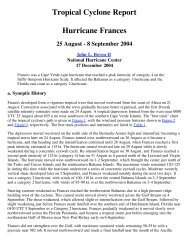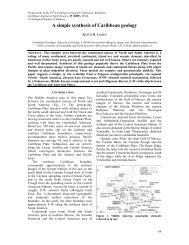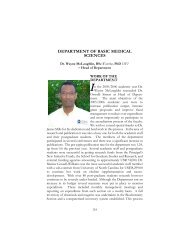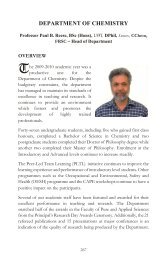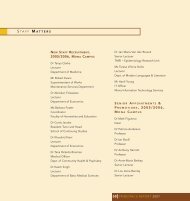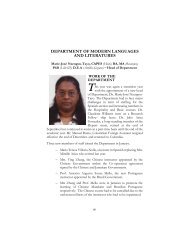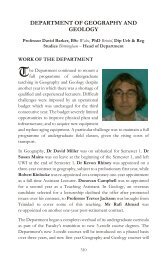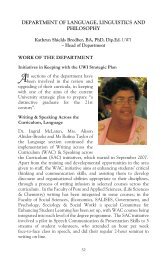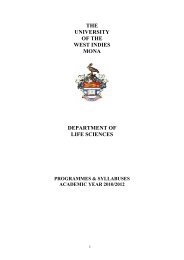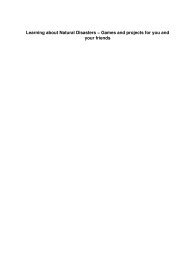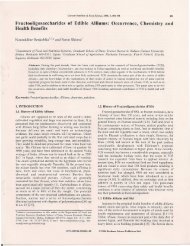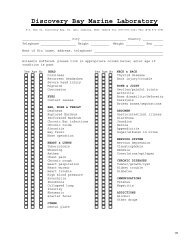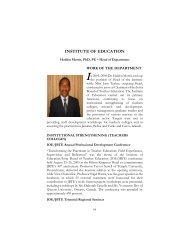Medical Sciences - University of the West Indies
Medical Sciences - University of the West Indies
Medical Sciences - University of the West Indies
Create successful ePaper yourself
Turn your PDF publications into a flip-book with our unique Google optimized e-Paper software.
Course OG60B: Introduction to Group Counselling<br />
This course begins by discussing <strong>the</strong> definitions, rationale,<br />
goals and types <strong>of</strong> groups included in group<br />
counselling. Group leadership characteristics, strategies,<br />
skills, functions and styles are <strong>the</strong>n explored,<br />
toge<strong>the</strong>r with issues <strong>of</strong> concern to group leaders.<br />
The process and practice <strong>of</strong> group counselling and<br />
<strong>the</strong> nature, roles and behaviour <strong>of</strong> group members<br />
are <strong>the</strong>n analyzed. The practical considerations involved<br />
in starting a group and <strong>the</strong> kinds <strong>of</strong> communication<br />
activities which students can use in groups<br />
are <strong>the</strong>n described. Students are taught how to<br />
evaluate groups and <strong>the</strong> module ends by exploring<br />
<strong>the</strong> wider applications <strong>of</strong> group counselling.<br />
Course OG60C: Abnormal Psychology<br />
This course begins by identifying <strong>the</strong> benefits and pitfalls<br />
<strong>of</strong> psychiatric classifications and how <strong>the</strong>y have<br />
been used and misused by counsellors and o<strong>the</strong>r<br />
health pr<strong>of</strong>essionals. Instruments which are used in<br />
<strong>the</strong> assessment and diagnosis <strong>of</strong> <strong>the</strong> conditions covered<br />
in <strong>the</strong> course are discussed as each new topic<br />
is introduced. Learning disabilities are <strong>the</strong>n explored<br />
and Block A ends with a focus on mental retardation.<br />
Block B begins by looking at stress and coping<br />
and <strong>the</strong> aetiology, signs, symptoms, treatment and<br />
management <strong>of</strong> anxiety disorders, mood disorders,<br />
schizophrenia, personality disorders and eating<br />
disorders. In Block C <strong>the</strong> focus shifts to substance<br />
abuse with an emphasis on a typology <strong>of</strong> abused<br />
substances, signs and symptoms <strong>of</strong> substance<br />
abuse, treatment, and management. The course<br />
ends with a general discussion <strong>of</strong> <strong>the</strong> psycho-social<br />
impact <strong>of</strong> <strong>the</strong>se conditions, legal issues and <strong>the</strong> role<br />
<strong>of</strong> <strong>the</strong> counsellor. Throughout <strong>the</strong> course <strong>the</strong> actual<br />
experiences <strong>of</strong> people who have been challenged<br />
by <strong>the</strong>se conditions are shared in order to retain <strong>the</strong><br />
emphasis on people ra<strong>the</strong>r than on impersonal and<br />
potentially destructive psychiatric labels.<br />
Course OG60D: Developmental Psychology<br />
This course <strong>of</strong>fers an introduction to physical, social,<br />
cognitive, moral and linguistic development with an<br />
emphasis on <strong>the</strong>ory and methodology. The biological<br />
and social bases <strong>of</strong> behaviour are explored and<br />
<strong>the</strong> pathology associated with failure to achieve psycho-social<br />
tasks at each stage is explored.<br />
Course OG61A: Person-Centred Counselling<br />
The course begins with an introduction to Carl Rogers<br />
and to Person-Centred Counselling. Rogers<br />
original writings are used to develop a thorough understanding<br />
<strong>of</strong> <strong>the</strong> philosophical base, <strong>the</strong> <strong>the</strong>oretical<br />
assumptions, beliefs and values which underlie<br />
Rogerian Counselling. Theoretical perspectives on<br />
<strong>the</strong> acquisition and maintenance <strong>of</strong> maladaptive behaviour<br />
and on <strong>the</strong> process <strong>of</strong> effecting <strong>the</strong>rapeutic<br />
personality change are explored. Primary emphasis<br />
is placed on how to establish a <strong>the</strong>rapeutic relationship<br />
and on developing <strong>the</strong> counsellors ability to<br />
demonstrate <strong>the</strong> conditions which facilitate personal<br />
growth. The focus <strong>the</strong>n shifts to Person-Centred<br />
Counselling in action and to a detailed examination<br />
<strong>of</strong> <strong>the</strong> counselling process and <strong>the</strong> development <strong>of</strong><br />
GRADUATE STUDENTS INFORMATION GUIDE 2011/2012 73<br />
FACULTY OF MEDICAL SCIENCES



